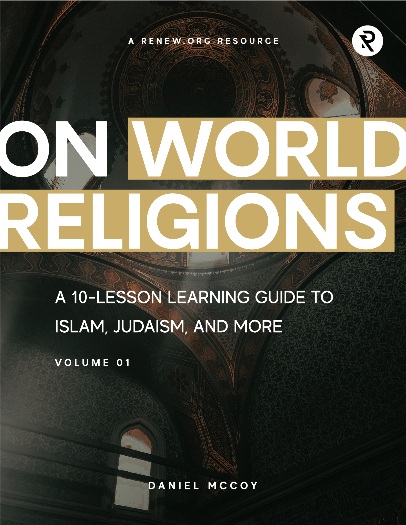
What Is Unitarian Universalism? The Basics of Unitarian Universalism in 10 Questions, 10 Definitions, and 10 Quotes
What are the basics of Unitarian Universalism? UU is historically a merger of two beliefs. First, Unitarianism: God is absolutely one (there is no Trinity). Second, Universalism: everyone will be saved in the end. These two beliefs assume some basic elements of the Christian worldview (God’s existence, salvation, eternity) which today’s UU does not necessarily embrace. Contemporary UU is a proudly diverse conglomeration of neopagan, humanist, atheistic, etc. elements which prioritizes principled social action over God-centered beliefs.
What Are the Basics of Unitarian Universalism? 10 Questions
- Unitarians and Universalists once largely considered themselves of what religious persuasion (although not in the mainstream sense), whereas today’s Unitarian Universalist Association does not consider itself this religion in any official sense whatsoever? Christian
- Although not large in number (hundreds of thousands instead of millions), the adherents of UUA tend to be affluent and well what? Educated
- What 16th century Spanish physician was burned at the stake for his books attacking the doctrine of the Trinity? Michael Servetus
- Though initially persecuted throughout Europe, Unitarianism found a home in what kind of churches in America? Congregational
- What early Universalist founded the first Universalist church on American soil, in Gloucester, Massachusetts? John Murray
- As Unitarians and Universalists drifted further from orthodox Christianity, they found themselves embracing similar beliefs to each other. In 1961, the American Unitarian Association merged with the Universalist Church of America to form what organization, with its headquarters in Boston? Unitarian Universalist Association
- The UUA has long been on the leading edge of progressive causes, having removed all “patriarchal” and “sexist” references from their hymnbook, supporting “right to die” and pro-abortion legislation, and being the first religious body to perform what kinds of union in 1984? gay ceremonies of union
- What is the official symbol of the UUA? flaming chalice
- Although neopagan, atheistic, pantheistic, process, and New Spirituality views of God are found in UUA churches, what major doctrine of God is rejected? Trinity
- If Jesus was nothing more than a teacher who taught some important spiritual and ethical truths, then it is natural to reject any notion that we need Jesus as savior to save us from any innate sinfulness. Anything that Jesus attained, we too are capable of. Unitarianism thus allows us to focus on the basic goodness of all people, which leads us to believe in the possibility that all people will be saved, which is the essence of what belief? Universalism
What Are the Basics of Unitarian Universalism? 10 Definitions
- Unitarianism – the explicitly anti-Trinitarian belief that there is one God with no persons within the Godhead, often arising in Congregational churches
- Universalism – the belief that, in the end, everyone will be saved
- Transcendentalism – the belief that religious experience and intuition become the touchstones of truth; God reveals himself directly to our souls instead of through external revelation like the Bible; this movement made famous by Ralph Waldo Emerson drew heavily from the Unitarians
- Humanism – the belief that religion must focus on human beings and not on God; humans create their own destinies, solve their own problems, and should concern themselves with this present life; this movement found a religious home in Unitarianism
- Religious pluralism – the belief that all religions are true or able to save the adherent in some way; because of UUA’s commitment to this belief, there is no single doctrine of God in UUA, but rather doctrines of God; thus, UUA can accommodate contradictory views of God, such as atheism, pantheism, and paganism
- Arianism – an early non-Trinitarian offshoot of Christianity which described Jesus as of “like nature” to God, but not fully God in essence
- Process Theology – the idea of a finite, mutable god who is growing and evolving along with the universe; this is an idea that finds a home in UUA churches
- Neopaganism – a nature-centered movement attempting to revive the pre-Christian, polytheistic, and pantheistic spirituality of Europe, often using rituals associated with magic and witchcraft; this is an idea that finds a home in UUA churches
- Principles and Purposes – a statement adopted as bylaws for the UUA which describe seven UUA values, including human dignity, justice and equity, acceptance, and world community
- Humanist Manifesto – a series of books codifying the humanist position: Humanist Manifesto I (1933), Humanist Manifesto II (1973), and Humanist Manifesto III (2003); half of the first Manifesto’s signers were Unitarian ministers
What Are the Basics of Unitarian Universalism? 10 Quotes
The Seven Principles
“The Principles are not dogma or doctrine, but rather a guide for those of us who choose to join and participate in Unitarian Universalist religious communities.”
—Rev. Barbara Wells ten Hove, in “The Seven Principles,” Unitarian Universalist Association
The Seven Principles are
- “The inherent worth and dignity of every person;
- Justice, equity and compassion in human relations;
- Acceptance of one another and encouragement to spiritual growth in our congregations;
- A free and responsible search for truth and meaning;
- The right of conscience and the use of the democratic process within our congregations and in society at large;
- The goal of world community with peace, liberty, and justice for all;
- Respect for the interdependent web of all existence of which we are a part.”
—“The Seven Principles,” Unitarian Universalist Association
The Basics of Unitarian Universalism: “Respect for the interdependent web of all existence of which we are a part.”
God and Humans
“We believe that human beings are responsible for the future; that history is in our hands, not those of an angry God or inexorable fate.”
—Rev. Dr. William F. Schulz, in “Atheist and Agnostic Unitarian Universalists,” Unitarian Universalist Association
“We are building an action-oriented community, bridging races, religions, and creeds with a shared desire to make faith, religion, and spirituality verbs.”
—“We Welcome People With Many Beliefs,” Unitarian Universalist Association,
“Our faith is not interested in saving your soul. We’re here to help you unfold the awesome soul you already have.”
—Andrea Lerner, quoted in “Worship Services and Inspiration,” Unitarian Universalist Association
The Basics of Unitarian Universalism: “Our faith is not interested in saving your soul. We’re here to help you unfold the awesome soul you already have.”
Sources of Inspiration
“These are the six sources our congregations affirm and promote: Direct experience of that transcending mystery and wonder…words and deeds of prophetic people…wisdom from the world’s religions…teachings which call us to respond to God’s love by loving our neighbors…humanist teachings which counsel us to heed the guidance of reason and the results of science…spiritual teachings of Earth-centered traditions.”
—“Sources of Our Living Tradition, Unitarian Universalist Association
“Elements of a typical Unitarian Universalist Sunday morning worship service include:
- Words of welcome
- Lighting a flaming chalice, the symbol of our faith
- A multigenerational segment, such as a “story for all ages”
- Music, both instrumental and vocal and in a variety of styles
- A time for lifting up the joys and concerns of the congregation
- A meditation or prayer
- Readings—ancient or contemporary
- A sermon given by a professional minister, a guest speaker, or a member of the congregation
- An offering, collecting financial donations for the congregation or for justice work in the community.”
—“Unitarian Universalist Worship Services,” Unitarian Universalist Association
The Basics of Unitarian Universalism: “wisdom from the world’s religions…spiritual teachings of Earth-centered traditions.”
Ethics
“Unitarian Universalists have a moral responsibility to demand and ensure that abortion protections are codified into law.”
—“We Do Not Consent: Taking Action to Ensure Access to Abortion,” Unitarian Universalist Association
“The forced labor, egregious punishments, and inhuman sufferings of Americans of African descent during the chattel enslavement era catapulted America into a world superpower, financially and militarily….no group has escaped the dominant narrative of white supremacy in our educational system, thereby requiring modernization of secondary and higher education.”
—“Anti-Racism and Reparations Via Restorative Justice,” Unitarian Universalist Association
“As Unitarian Universalists (UUs), we not only open our doors to people of all sexual orientations and gender identities, we value diversity of sexuality and gender and see it as a spiritual gift. We create inclusive religious communities and work for LGBTQ justice and equity as a core part of who we are. All of who you are is sacred. All of who you are is welcome.”
—“Lesbian, Gay, Bisexual, Transgender, and Queer Justice,” Unitarian Universalist Association
The Basics of Unitarian Universalism: “All of who you are is sacred. All of who you are is welcome.”
2 Questions about Unitarian Universalism for Christians to Consider
- As popular as universalism is, why have most Christians throughout history rejected this belief as unbiblical?
- There are going to be cultural pressures to cave into progressive theology (e.g., giving up on doctrines such as the Trinity and the final judgment). What are some steps you can take which will help you stand firm on the Bible’s authority even when it teaches doctrines which are unpopular?








